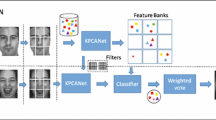Abstract
Kernel principal component analysis (KPCA) is an effective method for face recognition. However, the expression of its final solution needs to take advantage of all training examples, such that its run in real-world application with large scale training set is time-consuming. This paper proposes to apply radial basis function neural network (RBFNN) to learn the feature extraction process of KPCA in order to improve the running efficiency of KPCA-based face recognition system. Experimental results based on two different face benchmark data sets, including ORL and UMIST, show that the proposed method can approach to the recognition accuracy of the original KPCA, but have sparser solutions. The proposed method can be applied to real-time or online face recognition systems.
Access this chapter
Tax calculation will be finalised at checkout
Purchases are for personal use only
Preview
Unable to display preview. Download preview PDF.
Similar content being viewed by others
References
Zhao, W., Chellappa, R., Phillips, P., Rosenfeld, A.: Face recognition: A literature survey. ACM Computing Surveys 35(4), 399–458 (2003)
Zhu, N., Li, S.: A Kernel-based sparse representation method for face recognition. Neural Computing and Applications, 1–8 (2012)
Kirby, M., Sirovich, L.: Application of the KL procedure for the characterization of human faces. IEEE Transactions on Pattern Analysis and Machine Intelligence 12(1), 103–108 (1990)
Schölkopf, B., Smola, A., Muller, K.: Nonlinear component analysis as a kernel eigenvalue problem. Neural Computation 10, 1299–1319 (1998)
Xu, Y..., Li, M.: A method for speeding up feature extraction based on KPCA. Neurocomputing 70(4-6), 1056–1061 (2007)
Er, M.J..., Toh, H.L.: Face recognition with radial basis function (RBF) neural networks. IEEE Transactions on Neural Network 13(3), 697–710 (2002)
Duda, R.O., Hart, P.E., Stork, D.G.: Pattern Classification, 2nd edn. John Wiley & Sons, Inc. (2000)
Author information
Authors and Affiliations
Editor information
Editors and Affiliations
Rights and permissions
Copyright information
© 2013 Springer-Verlag Berlin Heidelberg
About this paper
Cite this paper
Hao, W., Li, J., Zhang, X. (2013). Learning KPCA for Face Recognition. In: Huang, DS., Gupta, P., Wang, L., Gromiha, M. (eds) Emerging Intelligent Computing Technology and Applications. ICIC 2013. Communications in Computer and Information Science, vol 375. Springer, Berlin, Heidelberg. https://doi.org/10.1007/978-3-642-39678-6_24
Download citation
DOI: https://doi.org/10.1007/978-3-642-39678-6_24
Publisher Name: Springer, Berlin, Heidelberg
Print ISBN: 978-3-642-39677-9
Online ISBN: 978-3-642-39678-6
eBook Packages: Computer ScienceComputer Science (R0)




